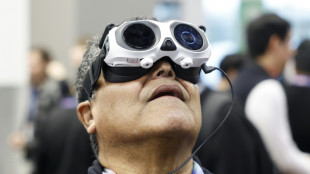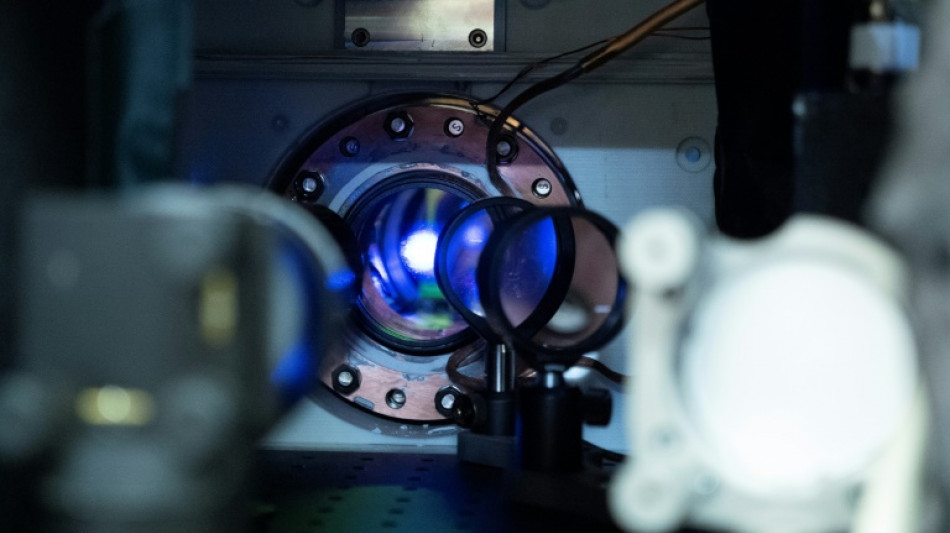
-
 Polish farmers march against Mercosur trade deal
Polish farmers march against Mercosur trade deal
-
Swiatek wins in 58 minutes as Poland reach United Cup semis

-
 Ski great Hirscher pulls out of Olympics, ends season
Ski great Hirscher pulls out of Olympics, ends season
-
'War is back in vogue,' Pope Leo says
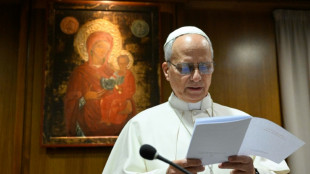
-
 Storms pummel northern Europe causing travel mayhem and power cuts
Storms pummel northern Europe causing travel mayhem and power cuts
-
France has right to say 'no' to US, Paris says
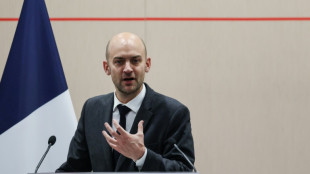
-
 TikTok drives 'bizarre' rush to Prague library's book tower
TikTok drives 'bizarre' rush to Prague library's book tower
-
EU countries override France to greenlight Mercosur trade deal

-
 Russia joins Chinese, Iran warships for drills off S.Africa
Russia joins Chinese, Iran warships for drills off S.Africa
-
Stocks rise ahead of US jobs data and key tariffs ruling

-
 'All are in the streets': Iranians defiant as protests grow
'All are in the streets': Iranians defiant as protests grow
-
Kurdish fighters refuse to leave Syria's Aleppo after truce

-
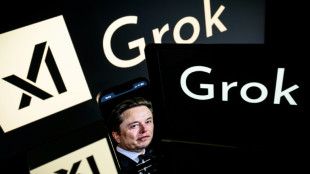 Grok turns off AI image generation for non-payers after nudes backlash
Grok turns off AI image generation for non-payers after nudes backlash
-
Germany factory output jumps but exports disappoint

-
 Defiant Khamenei insists 'won't back down' in face of Iran protests
Defiant Khamenei insists 'won't back down' in face of Iran protests
-
Russian strikes cut heat to Kyiv, mayor calls for temporary evacuation

-
 Switzerland holds day of mourning after deadly New Year fire
Switzerland holds day of mourning after deadly New Year fire
-
Hundreds of thousands without power as storms pummel Europe

-
 Man City win race to sign forward Semenyo
Man City win race to sign forward Semenyo
-
Experts say oceans soaked up record heat levels in 2025

-
 'Would be fun': Alcaraz, Sinner tease prospect of teaming up in doubles
'Would be fun': Alcaraz, Sinner tease prospect of teaming up in doubles
-
Man City win race to sign Semenyo

-
 Chinese AI unicorn MiniMax soars 109 percent in Hong Kong debut
Chinese AI unicorn MiniMax soars 109 percent in Hong Kong debut
-
Iran rocked by night of protests despite internet blackout: videos

-
 Swiatek romps to United Cup victory in 58 minutes
Swiatek romps to United Cup victory in 58 minutes
-
Procession of Christ's icon draws thousands to streets of Philippine capital

-
 Every second counts for Japan's 'King Kazu' at 58
Every second counts for Japan's 'King Kazu' at 58
-
Syria announces ceasefire with Kurdish fighters in Aleppo

-
 Russia hits Ukraine with hypersonic missile after rejecting peacekeeping plan
Russia hits Ukraine with hypersonic missile after rejecting peacekeeping plan
-
Asian stocks mixed ahead of US jobs, Supreme Court ruling

-
 Scores without power as Storm Goretti pummels Europe
Scores without power as Storm Goretti pummels Europe
-
Sabalenka gets revenge over Keys in repeat of Australian Open final

-
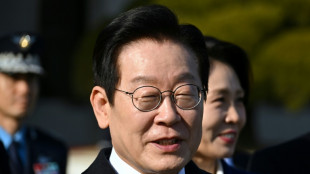 Fresh from China, South Korea president to visit Japan
Fresh from China, South Korea president to visit Japan
-
Injured Kimmich to miss icy Bundesliga return for Bayern

-
 Rybakina has little hope of change to tennis schedule
Rybakina has little hope of change to tennis schedule
-
Osimhen, Nigeria seek harmony with Algeria up next at AFCON

-
 US immigration agent's fatal shooting of woman leaves Minneapolis in shock
US immigration agent's fatal shooting of woman leaves Minneapolis in shock
-
After fire tragedy, small Swiss town mourns 'decimated generation'

-
 Switzerland mourns Crans-Montana fire tragedy
Switzerland mourns Crans-Montana fire tragedy
-
Russia bombards Kyiv after rejecting peacekeeping plan

-
 Crunch time for EU's long-stalled Mercosur trade deal
Crunch time for EU's long-stalled Mercosur trade deal
-
Asian stocks rally ahead of US jobs, Supreme Court ruling

-
 'Sever the chain': scam tycoons in China's crosshairs
'Sever the chain': scam tycoons in China's crosshairs
-
Bulls-Heat NBA game postponed over 'moisture' on court

-
 Arsenal's Martinelli 'deeply sorry' for shoving injured Bradley
Arsenal's Martinelli 'deeply sorry' for shoving injured Bradley
-
Christ icon's procession draws thousands to streets of Philippine capital

-
 Moleiro shining as Villarreal make up La Liga ground after cup failures
Moleiro shining as Villarreal make up La Liga ground after cup failures
-
New Chelsea boss Rosenior faces FA Cup test

-
 Vietnam shrugs off Trump tariffs as US exports surge
Vietnam shrugs off Trump tariffs as US exports surge
-
Syrian government announces ceasefire in Aleppo after deadly clashes


How world's most precise clock could transform fundamental physics
US scientists have measured Albert Einstein's theory of general relativity -- which holds that gravity slows time down -- at the smallest scale ever, demonstrating that clocks tick at different rates when separated by fractions of a millimeter.
Jun Ye, of the National Institute of Standards and Technology (NIST) and the University of Colorado Boulder, told AFP it was "by far" the most precise clock ever built -- and could pave the way for new discoveries in quantum mechanics, the rulebook for the subatomic world.
Ye and colleagues published their findings in the prestigious journal Nature on Wednesday, describing the engineering advances that enabled them to build a device 50 times more precise than their previous best clock, itself a record-breaker, built in 2010.
It was more than a century ago, in 1915, that Einstein put forward his theory of general relativity, which held that the gravitational field of a massive object distorts space-time.
This causes time to move more slowly as one approaches closer to the object.
But it wasn't until the invention of atomic clocks -- which keep time by detecting the transition between two energy states inside an atom exposed to a particular frequency -- that scientists could prove the theory.
Early experiments included the Gravity Probe A of 1976, which involved a spacecraft six thousand miles (10,000 kilometers) above Earth's surface and showed that an onboard clock was faster than an equivalent on Earth by one second every 73 years.
Since then, clocks have become more and more precise, and thus better able to detect the effects of relativity.
A decade ago, Ye's team set a record by observing time moving at different rates when their clock was moved 33 centimeters (just over a foot) higher.
- Theory of everything -
Ye's key breakthrough was working with webs of light, known as optical lattices, to trap atoms in orderly arrangements. This is to stop the atoms from falling due to gravity or otherwise moving, resulting in a loss of accuracy.
Inside Ye’s new clock are 100,000 strontium atoms, layered on top of each other like a stack of pancakes, in total about a millimeter high.
The clock is so precise that when the scientists divided the stack into two, they could detect differences in time in the top and bottom halves.
At this level of accuracy, clocks essentially act as sensors.
"Space and time are connected," said Ye. "And with time measurement so precise, you can actually see how space is changing in real time -- Earth is a lively, living body."
Such clocks spread out over a volcanically-active region could tell geologists the difference between solid rock and lava, helping predict eruptions.
Or, for example, study how global warming is causing glaciers to melt and oceans to rise.
What excites Ye most, however, is how future clocks could usher in a completely new realm of physics.
The current clock can detect time differences across 200 microns -- but if that was brought down to 20 microns, it could start to probe the quantum world, helping bridge gaps in theory.
While relativity beautifully explains how large objects like planets and galaxies behave, it is famously incompatible with quantum mechanics, which deals with the very small, and holds that everything can behave like a particle and a wave.
The intersection of the two fields would bring physics a step closer to a unifying "theory of everything" that explains all physical phenomena of the cosmos.
Ch.Havering--AMWN
